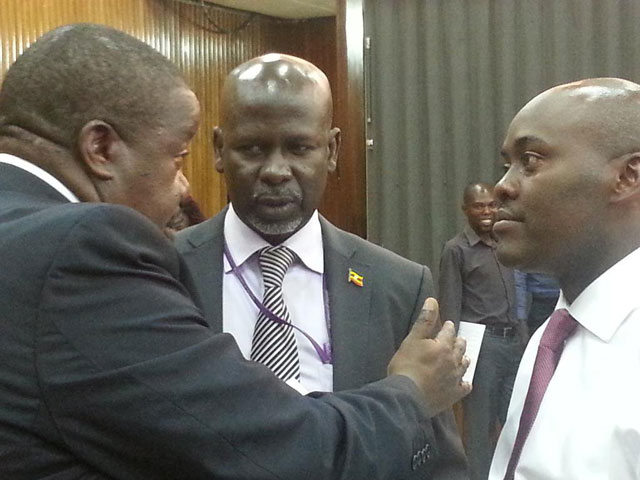
‘The price of lenience’
Baine says the slow execution should speak of how unnecessary the death penalty has become and that Uganda should join the global crusade to abolish the sentence completely. He said more than 15 countries in Africa have abolished it.
Baine speaks of the Supreme Court judgment in an appeal of Susan Kigula and 416 others vs Attorney General that saved a lot of people from being hanged. Kigula, together with her house help, Patience Nansamba were sentenced to death for killing her husband. Court heard that Susan Kigula, together with her maid cut her husband’s throat while he lay in bed.
But Kigula, together with 416 others, in a move that would rock the legal field decided to appeal in order to have the death sentence declared unconstitutional and abolished in Uganda. The appeal that dragged on for nearly 10 years ended up in the Supreme Court where she lost in her desire to have the death sentence abolished. But the case led to serious changes to the death penalty as mandatory death sentences were abolished in favour of having each case handled individually. That is how, years later, Kakaire can be sentenced to 40 years in prison even after confessing to murder.
To Baine, all this was done because the judicial officers realized that the death sentence is not a deterrent to crime and Article 22 of the constitution provides that everyone has a right to live and no one should take away that right.
He said as prison officers, they are reformists who believe that a convict can still be useful in society whether while still in prison or after they have served their sentence.
President Museveni has over the years been seen to be in favor of the Baine argument.
In 2009, using his prerogative of mercy, the President in a prominent decision pardoned Chris Rwakasisi, a former Minister for Internal Affairs in Milton Obote’s government who had been on death row since 1985.
Also, at a campaign rally in Fort Portal town in 2016, he hinted on the possible pardoning of former Tooro Kingdom Prime Minister John Sanyu Katuramu. Museveni said he had no problem with pardoning Katuramu who had been on death row for assassinating Prince Charles Kijanangoma. His sentence was reduced to life imprisonment after the Kigula appeal judgment.
But Museveni’s magnanimity seems to have recently changed.
During theJudges Annual Conference in January last year, Museveni said he will soon resume executions.
“We believe in the Law of Moses; eye for an eye”, he said “I have been making the mistake of not sanctioning these death sentences, I am repenting”.
Four months later, he re –echoed his plan at the commission of prison officers saying that criminals are taking his leniency for granted. “Criminals think they have a right to kill people and then just keep their own heads….. I am going to revise a bit and hung a few.”
He said removing the death penalty from the law books of a country like Uganda which is pre- industrial will only cause chaos.
Shamim Nalugemwa, an advocate working with Uganda Law Society agrees. She says the penalty should stay to tame those that are unremorseful. But, she says, the processes for dispensing justice should be refined to ensure that people do not get punished for crimes they did not commit.
“It was gruesome. There was no time limit; they could hang even after 10 years, seven months, whenever they felt like. Do you know the trauma that would cause? That’s why we used to hear of someone hanging themselves in prison,” she says.
For her, the discussion of whether or not to retain the penalty started long ago having been discussed even during the SSempebwa Constitutional Review Commission and should be guided by arguments of why punishment is given.
“Why do we punish? Is it to revenge or to deter?” she says. According to her, those that have reformed should be rehabilitated and sent back to their communities.
Her argument is supported by the mover of the amendment Bill in parliament – Merdard Lubega Seggona (MP Busiro East) who said the current law on the death penalty should be left intact for the most serious crimes.
He says the death penalty is considered the very last resort as capital punishment. He says to qualify; one has to have gone through a lot of processes that take a lot of time. That is why a convict is given a chance to go up to the highest court of the land – the Supreme Court to defend themselves. He says that’s why his Bill is not about erasing or not erasing the death penalty but about aligning the laws that dictate the penalty with the decision of the Supreme Court making death penalty discretionary.
“That debate came up because MPs didn’t understand what these amendments are about. It’s about harmonising all the laws that talk about penalty to ensure that mandatory death penalty for death sentence is removed and left to the discretion of the judge hearing a particular case,” he said.
The Bill that is due for second reading seeks to amend the Penal Code Act, Cap 120, the Anti-Terrorism Act, 2002, the Uganda People’s Defence Forces Act, 2005, and the Trial on Indictment Act, Cap 23.
 The Independent Uganda: You get the Truth we Pay the Price
The Independent Uganda: You get the Truth we Pay the Price





